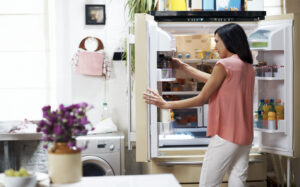
Preventing high energy bills is a balance of energy usage and efficiency. You can have energy-efficient appliances, but if you’re running them constantly, it won’t help you lower your energy bills. The same goes for energy usage—you can try to cut back, but if your appliances aren’t energy efficient, your energy bill may be higher than expected. Learning what appliances, home systems, and electronics use the most electricity and how to cut back on their use can help.
Air Conditioning and Heating
Most of your energy usage goes toward heating or cooling your home—a whopping 46%. Electricity is measured in Watts or Kilowatts. The higher the wattage, the more electricity is used. This, combined with the time an appliance is used, affects your energy bill. An average central HVAC unit uses about 3,500 watts. In a month, it can use anywhere from 850 to 1,950 kWh, depending on the efficiency of your unit and the time of year. This breaks down to hundreds of dollars per year.
To cut back on HVAC use, follow these tips:
- Adjust your thermostat to 78 degrees in the summer and 65 degrees in the winter.
- Use fans. Have them spin counterclockwise in the summer and clockwise in the winter.
- Get your HVAC system checked and tuned up annually.
- Use curtains—keep them closed in the summer, but open in the winter.
- Replace air filters to ensure your HVAC system is running efficiently.
- Don’t block inside vents or outside units—this can cause them to work harder than necessary.
- Clean your air ducts.
- Utilize your clothing. Dress lightly in the summer and warmly in the winter.
- Use blankets and scarves to stay warm in the winter.
Water Heating
Your water heater uses about 14% of your home’s energy usage. It can use around 405 kWh per month, or 4,860 kWh per year. Use these tips to reduce your water heater’s energy use:
- Take a shower instead of a bath. The average bathtub requires about 70 gallons of water, while a 5-minute shower uses 10 to 25 gallons.
- Turn your water heater’s temperature down to 120 degrees or lower.
- Wrap your water heater with an insulation jacket if it’s old.
- Insulate hot water pipes.
- Turn down your water heater when you go on vacation or leave your house for more than a day.
- Install water-conserving showerheads and faucet aerators.
Appliances
Your home’s appliances—including your refrigerator, washer, dryer, electric oven, and stove—make up about 13% of your electric bill.
The average refrigerator uses about 225 watts and is constantly running. This comes out to about 162 kWh per month. Because you can’t simply turn off your refrigerator to save on energy, follow these tips:
- Don’t overload your refrigerator. This will cause your refrigerator to work harder, wasting energy.
- Keep your most-used products in the front. This will prevent you from having to keep the door open as long.
- Set your fridge to the manufacturer’s recommended temperature.
- Regularly clean behind and underneath your refrigerator so its vents remain clear and unblocked.
- Replace older refrigerators with energy-efficient models, like those offered by ENERGY STAR.
Washers and dryers make up around 5% of your home’s total energy consumption and can use around 3,045 watts per year. To save energy, keep these tips in mind:
- Wash full loads. Save your laundry until you have enough clothing to fill, but not overload, your washer or dryer.
- Use cold water. Hot water is much more expensive and can cause colors to run.
- Use drying racks instead of your dryer when possible.
- Clean the lint in your dryer after each load. Not only is it a fire hazard, but a clogged lint filter can make your dryer run less efficiently.
An average 2,500-watt oven and 1,500-watt stove used for one hour per day comes out to around 45 kWh of energy use per month. These appliances can make your home warmer, causing your AC to work harder. Reduce energy use from these appliances:
- Use smaller appliances instead, such as a toaster oven, microwave, slow cooker, or air fryer.
- Use the oven and stove during cooler hours, such as early morning and night.
- Don’t preheat unless it’s necessary for your food to cook properly and safely.
- Turn off burners a few minutes before your dish is done cooking. Residual heat will do the rest.
Lighting
Lighting accounts for around 9% of your home’s total energy usage. Light bulbs’ energy use can vary based on the type of bulb. Since we’re almost always using lights, the average home uses about 300 kWh of energy per month. Use these tips to cut back:
- Turn off lights when you leave a room.
- Use energy-efficient LED light bulbs instead of incandescent bulbs.
- Use natural light from windows, especially in winter.
- Install motion detectors on outdoor security lights so they only turn on when triggered.
Electronics
Electronics, like televisions, cable boxes, and video game consoles, make up about 4% of your total energy use. These devices are tricky because they use standby power even when they’re not being used. Try these tips:
- Deactivate standby mode and quick-start settings.
- Reduce screen brightness on televisions and monitors.
- Turn off electronics when not in use.
- Choose energy-free activities like reading and board games.
Interested in saving money on your home’s energy bill? Contact the experts at UGI EnergyLink today.